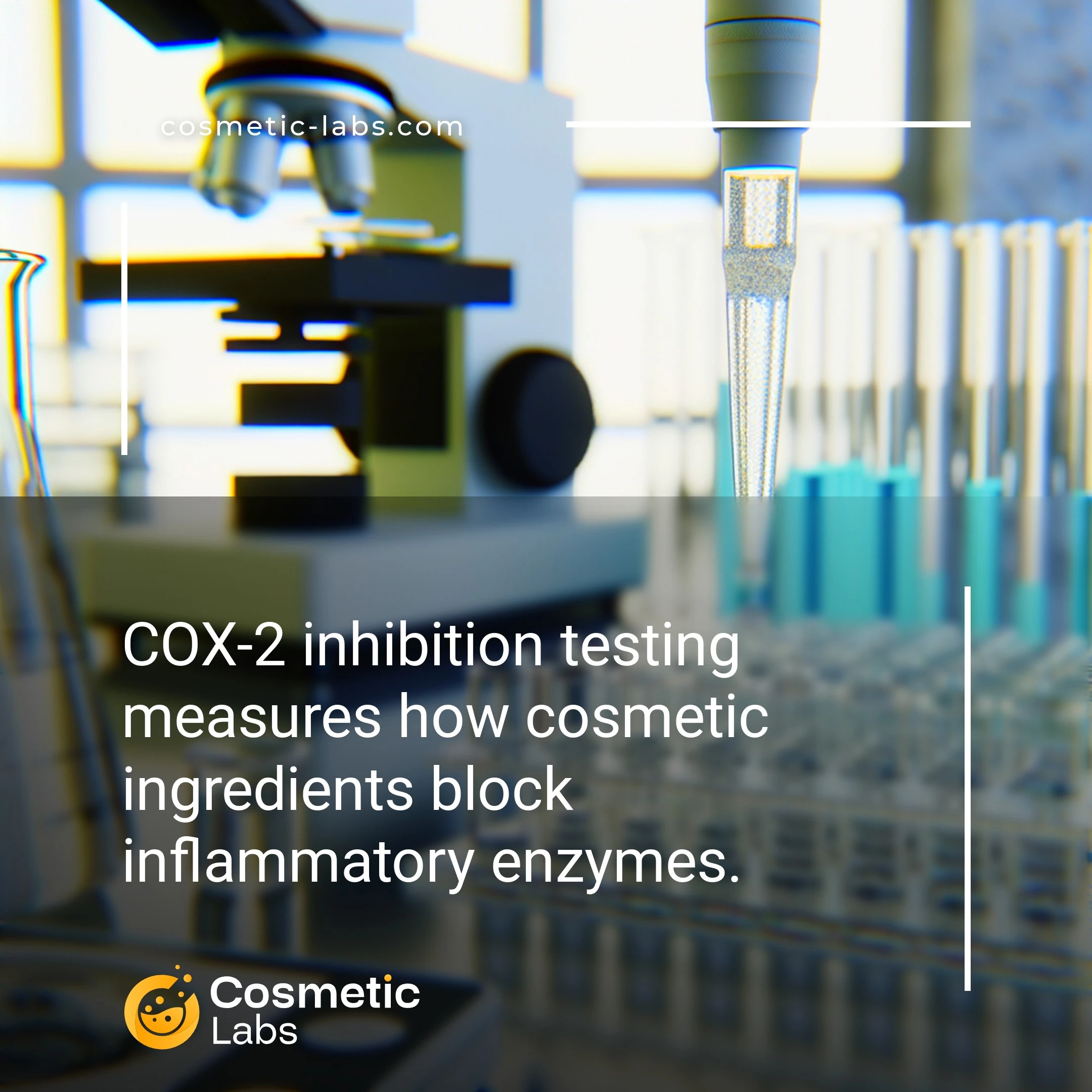COX-2 Inhibition Testing Services for Anti-Inflammatory Cosmetics

What is COX-2 inhibition?
COX-2 inhibition testing for inflammatory conditions measures how effectively cosmetic ingredients block cyclooxygenase-2 enzymes that trigger skin inflammation and redness. Labs use cell-based assays and tissue models to evaluate anti-inflammatory potency of botanical extracts, peptides, and synthetic compounds. This testing reveals which formulations can reduce prostaglandin E2 production by 50-80%, helping brands develop products for sensitive skin, rosacea, and post-procedure recovery treatments.
Why do you need this service?
Cosmetic labs use COX-2 inhibition assays to validate anti-inflammatory claims for skincare products targeting acne, rosacea, and sensitive skin conditions. These tests measure how effectively your formulations reduce prostaglandin E2 production in keratinocytes, providing quantifiable data for regulatory submissions and marketing claims that resonate with consumers seeking gentle, science-backed solutions.
Who provides COX-2 inhibition services?
All cosmetic labs providing COX-2 inhibition services
There is no company providing these services at the moment.
COX-2 Inhibition Testing for Anti-Inflammatory Cosmetic Development
COX-2 inhibition testing measures how effectively your cosmetic ingredients block cyclooxygenase-2 enzyme activity, a key driver of skin inflammation. This preclinical assay helps validate anti-inflammatory claims for skincare products targeting conditions like acne, rosacea, and sensitive skin reactions.
Laboratory Testing Methods and Protocols
Labs use enzyme-based assays to quantify COX-2 inhibition rates across different ingredient concentrations. The standard protocol involves exposing COX-2 enzymes to your test compounds and measuring prostaglandin E2 production levels.
Testing typically includes:
- Dose-response curves from 0.1% to 10% concentrations
- IC50 value determination (concentration for 50% inhibition)
- Selectivity testing against COX-1 enzyme
- Positive controls using known anti-inflammatory compounds
Results help formulators optimize ingredient ratios and support regulatory submissions for anti-inflammatory product claims.
Applications in Cosmetic Product Development
Brand owners use COX-2 inhibition data to differentiate products in competitive markets like anti-aging and acne treatments. The testing validates botanical extracts, synthetic actives, and novel peptides before expensive clinical trials.
Common applications include:
- Screening plant extracts for anti-inflammatory potential
- Comparing ingredient efficacy against competitor benchmarks
- Supporting marketing claims with scientific evidence
- Optimizing formulation stability and bioavailability
Connect with specialized cosmetic labs on our platform to discuss COX-2 testing protocols tailored to your specific product development needs and regulatory requirements.
Practical Applications of COX-2 Inhibition Testing in Cosmetic Development
Cosmetic labs use COX-2 inhibition testing for inflammatory response evaluation to validate anti-inflammatory claims and optimize formulations before market launch.
Anti-Aging Product Development
Beauty brands developing serums and creams targeting skin aging rely on COX-2 inhibition assays to measure how effectively their formulations reduce inflammatory pathways. Labs test active ingredients like resveratrol, curcumin, and peptide complexes using standardized protocols that measure prostaglandin E2 reduction within 24-48 hours. This data supports marketing claims about reducing redness and improving skin texture.
Product developers use these results to adjust concentration levels and select the most potent anti-inflammatory compounds for their target demographic.
Sensitive Skin Formulation Validation
Cosmetic companies creating products for sensitive or reactive skin types use COX-2 inhibition testing to screen potential irritants and validate soothing ingredients. Labs evaluate botanical extracts, synthetic compounds, and preservative systems using cell-based assays that simulate inflammatory responses. Testing typically shows IC50 values ranging from 10-100 μg/mL for effective anti-inflammatory agents.
This approach helps brands avoid costly reformulations and reduces time-to-market by 3-6 months compared to traditional patch testing alone.
| Testing Method | Sample Volume | Results Timeline | Key Metrics |
|---|---|---|---|
| Cell-based COX-2 assay | 5-10 mL | 3-5 days | IC50, % inhibition |
| Enzyme inhibition screening | 1-2 mL | 24-48 hours | Prostaglandin E2 levels |
| Multi-target inflammation panel | 10-15 mL | 7-10 days | Cytokine profiles, pathway analysis |
Ready to validate your formulation’s anti-inflammatory properties? Connect with experienced cosmetic labs on our platform to discuss COX-2 inhibition testing protocols tailored to your product development needs.
